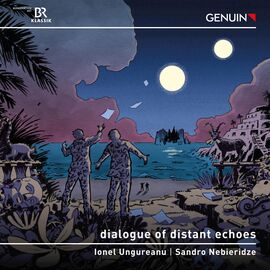Mit außerhalb des Fokus stehenden Kompositionen wollen die beiden Interpreten ihren von ihnen so verstandenen Dialog über zeitliche und stilistische Grenzen hinweg führen.
Die Suite für Viola und Klavier von Ernest Bloch als Verknüpfung von spätromantischen impressionistischen und modernen Elementen lässt die damals zeitgemäße Vorstellung des Fernen Ostens erklingen.
Die Ersteinspielung der Sonate für Viola und Klavier des tschechischen Komponisten Jaromír Ludvík Hruška zeigt zwar romantische Affekte, verbindet sie aber mit moderner Harmonik und experimentiert mit den Satzformen in ungewohnter Weise.
Der Dialog zwischen den beiden vorigen Werken wird abschließend in der Tunesischen Rhapsodie geführt. In dem neu von den beiden Interpreten komponierten Werk bauen sie eine Brücke, indem sie Motive und Klangsprachen von Bloch und Hruška mit Idiomen des Jazz verbinden.
Den sich befruchtenden Dialog zwischen den Werken und ihren Ideen, aus Tradition und der Freude am Experiment befeuern die beiden Interpreten mit ihrem Spiel.
Ionel Ungureanu führt dabei die Viola elegant ausdrucksvoll. Seine langjährigen Erfahrungen aus unterschiedlichen musikalischen Welten erleichtern es ihm, in die jeweilige Sprache eines Werkes hineinzufinden und diese treffend zu Tönen zu formen, die Interesse und Gefühle bei den Hörern fördern. Dabei findet er sich sicher in jede stilistische Nuance ein und kann diese dann auch mit Leichtigkeit umsetzen.
Sandro Nebieridze bringt den Klavierpart ebenso gekonnt ein. Sein Spiel zeigt die ungestörte Wichtigkeit des eigenen Beitrags genauso wie es den Dialog mit dem Partner an der Viola im regen Austausch beidseitigen Gebens und Nehmens betreibt. So gelingt es ihnen, die Reize der unbekannten Stücke heraus zu kitzeln und trotz mancher klangsprachlicher Sprödigkeit einnehmend zu interpretieren. Damit eröffnen sie sehr anregend neue Höreindrücke.
With compositions that are out of focus, the two performers want to carry out what they see as a dialog across temporal and stylistic boundaries.
The Suite for Viola and Piano by Bloch, a combination of late Romantic, impressionist and modern elements, brings to life the then contemporary idea of the Far East.
The first recording of the sonata for viola and piano by the Czech composer Jaromír Ludvík Hruška shows Romantic affects, but combines them with modern harmony and experiments with movement forms in an unusual way.
The dialog between the two previous works concludes with the Tunisian Rhapsody. In this new work composed by the two performers, they build a bridge by combining motifs and tonal languages from Bloch and Hruška with jazz idioms.
The two performers fuel the fruitful dialogue between the works and their ideas, between tradition and the joy of experimentation, with their playing.
Ionel Ungureanu plays the viola elegantly and expressively. His many years of experience in different musical worlds make it easier for him to find his way into the respective language of a work and to shape it into sounds that arouse the listener’s interest and emotions. In doing so, he finds his way into every stylistic nuance and is then able to realize them with ease.
Sandro Nebieridze plays the piano part just as skillfully. His playing shows the undisturbed importance of his own contribution as well as the dialog with his partner on the viola in a lively exchange of give and take on both sides. In this way, they succeed in teasing out the charms of the unfamiliar pieces and interpreting them in an engaging manner despite some of their brittle sound. In this way, they open up very stimulating new listening impressions.





















